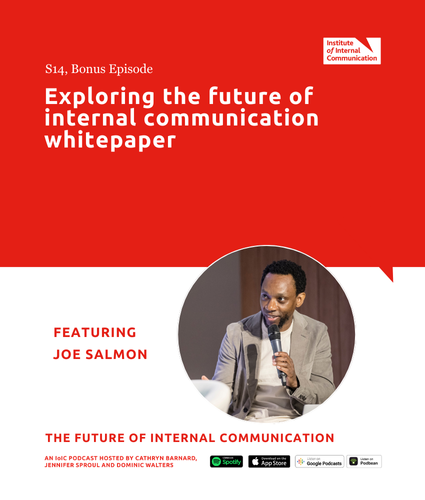I didn't start out on a mission to work in IC. Or follow a traditional route into University to tackle a communication discipline. Instead opting to join the corporate world at 19 with a view of spending 6 months to figure out “what I wanted to do”.
I spent 6 years of my earlier career in Change and Transformation roles and soon realised the impact of a badly communicated message, learning the importance of easy-to-read and simple language. It was easy when working in an area to fall into a trap of jargon, abbreviations or slang words, especially when working first-hand with developers or tech teams. But this language made comms complex and unreadable, in fact it turned off the majority of the target audience who just saw it as 'tech-speak'.
By switching up the tone of voice, adding in simple language and making the comms more engaging I was soon able to introduce change at a faster pace as the information was absorbed and understood by all colleagues.
That was where I truly found my passion for communications. My passion to drive an impact through good communications and engagement and I joined an IC team in 2018.
I’ve always enjoyed developing my skills, seeking development or developing others and wanted to use this passion to help further. Which is why in 2016 I’d applied to study a degree in family and child studies. I had previous volunteering experience working in schools (IT, English and Reading) and witnessing the children’s developmental growth gave a huge amount of pride and satisfaction.
However personal circumstances put a hold on my plans (and this was firmly put to one side when I had first hand experience of home schooling two young boys during the 2020 pandemic).
I took a short career break in 2019 for 6-months but made a return to IC knowing it would give me the same reward and satisfaction as a teaching role could offer.
Mainly because I could help to craft messages that can help the business connect with their audience, build their brand, and achieve their goals, in turn helping colleagues grow and develop just like the children had.
Working in communications gives me an ability to showcase information differently, not to just 'make it look pretty' but to think about the audience and what would really help them. What can help make a good comms stick. This is why I believe one of the key attributes to good communications is understanding your audience. I feel this is one of my strengths and helped me develop my career to where I am today. I get to know my audience. I do this through relationship building, gathering information and insight that can help me better deliver communications and a shared understanding. I don’t like a one-size fits all or ‘we’ve always done it this way’ so I will always look at different solutions or ways to improve.
Because I didn't start out my career in IC I believe this is a bonus as I’ve been on the other side, I’ve been the target audience and been in situations where I've not understood what was being communicated. I use this experience to my advantage and deliver messages complimented by a human-centric narrative. In doing so my communications are delivered clearly and give opportunity for colleagues to connect with the messaging and purpose.
As I mentioned I rejoined the world of IC in 2020 during what was classed as 'unprecedented' times and joined the transport industry 3 days before the UK entered lockdown. Now some may think this was the worst time to join an Internal Communications team, after all, the channels available were impacted, good news was limited and the entire world was in crisis mode.
But to me this was the best time to join. And I believe anyone in IC would agree, it was an opportunity for IC teams to flourish. For once everyone was bought into the importance of good communications and the impact it can have on colleagues. Especially when other traditional routes were no longer available.
It was a time communication professionals had to think outside the box, come up with creative solutions and assess what did or didn't work. Insight became crucial because messages were vital, but it also cut out a lot of the previous noise. Articles or comms that previously would have got the cut were re-assessed. Air traffic control was crucial and ensuring a steady drumbeat kept colleagues going! No longer was IC just a postbox. We had a purpose. It’s much more than making a comms look pretty.
I’m proof that you sometimes fall into IC but I wouldn’t have it any other way. It’s such a rewarding role to be involved in!
I would recommend anyone thinking about a career in Internal Communications who may not have the ‘traditional’ qualifications or skills to look at your transferable skills. You may be surprised to find it’s a great fit for you.
Find out more about #IChoseIC Campaign and how to get involved here.
IoIC Awards 2026
Find out everything you need to know with our entry guidance including top tips to help your submission stand out. Early Bird Entries must be submitted by 11.59pm on Friday 13 February and Standard Entries submitted by 11.59pm on Friday 17 April.Latest Podcast: Nurturing inclusive work cultures
In this bonus episode of season 14, Jen, Dom and Cat are interviewed by IoIC board member and fellow Joe Salmon. Together they discuss the factors driving change for internal communication and ways in which internal communicators can prepare for an altogether exciting future.








